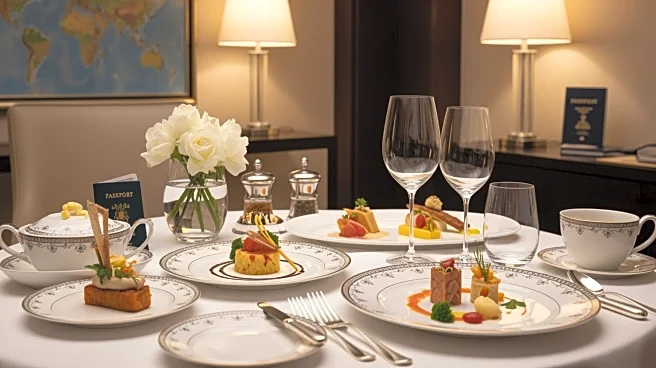What's Happening?
In 2025, luxury and resort hotels in the U.S. have experienced significant growth in food and beverage (F&B) revenue, driven by the increasing popularity of 'bleisure' travel, which combines business and leisure. According to CBRE's Hotel Horizons report,
F&B revenue per occupied room (POR) increased by 3.8% in the first half of 2025, surpassing the overall hotel revenue growth of 3.0%. This trend is attributed to the financial stability of high-income households and the post-pandemic resurgence in hotel F&B demand. Hotels have invested in revitalizing their F&B offerings, focusing on creative and personalized experiences to attract both in-house and external patrons. Despite a decline in beverage revenues, food revenue in hotel venues and banquet spaces has increased, with luxury resorts benefiting from a preference for hosting meetings at resort properties.
Why It's Important?
The growth in F&B revenue is crucial for U.S. hotels facing a slowdown in room revenue growth, which increased by only 0.8% in the first half of 2025. As hotels shift focus from occupancy to guest experiences, the F&B sector has become a vital source of ancillary revenue. This trend highlights the changing dynamics in the hospitality industry, where hotels are competing with local standalone restaurants by offering elevated culinary programs and modernized spaces. The success of F&B operations not only boosts hotel profitability but also reflects broader consumer preferences for unique and engaging experiences. The rise in bleisure travel indicates a shift in travel patterns, with more individuals combining work and leisure, impacting hotel strategies and revenue streams.
What's Next?
Hotels are likely to continue investing in their F&B offerings to capitalize on the bleisure travel trend. This includes enhancing menu optimization, improving service delivery, and creating more engaging dining experiences. As convention hotels face challenges with declining occupancy, they may need to adapt by focusing on attracting social and wedding group business, which remains strong. Additionally, hotels might explore new beverage categories, such as low-alcohol and mocktail alternatives, to cater to changing consumer preferences. The industry will need to address staffing shortages and adjust service delivery models to maintain profitability while meeting evolving guest expectations.
Beyond the Headlines
The shift towards bleisure travel and increased F&B revenue has broader implications for the hospitality industry, including potential changes in hotel design and marketing strategies. Hotels may need to rethink their spaces to accommodate both business and leisure travelers, creating environments that blend work and relaxation. This trend also raises questions about the sustainability of luxury travel and the impact on local economies, as hotels compete with local dining establishments. The focus on guest experiences over occupancy could lead to long-term shifts in how hotels measure success and prioritize investments.
















